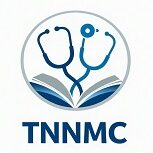ADN vs BSN: Salary, Careers + More in Nursing
The RN job market is booming in America and it is only going to get bigger. The aging population needing more complex treatment and a greater focus on preventive healthcare are just some of the factors driving this demand. According to a handful of projections, there should be a significant deficit in the supply of RNs that would meet the demand to abate the healthcare system.
Αll these forces place pressure on the health care system, Teresa Beck says, and in this environment, educating a strong and skilled nursing workforce becomes even more important. At once, the nursing profession and healthcare employers place a greater focus on education and its importance to the field.
This increasing importance means that those exploring a nursing career should weigh up the various educational pathways open to them and consider the long-term consequences of their decisions.
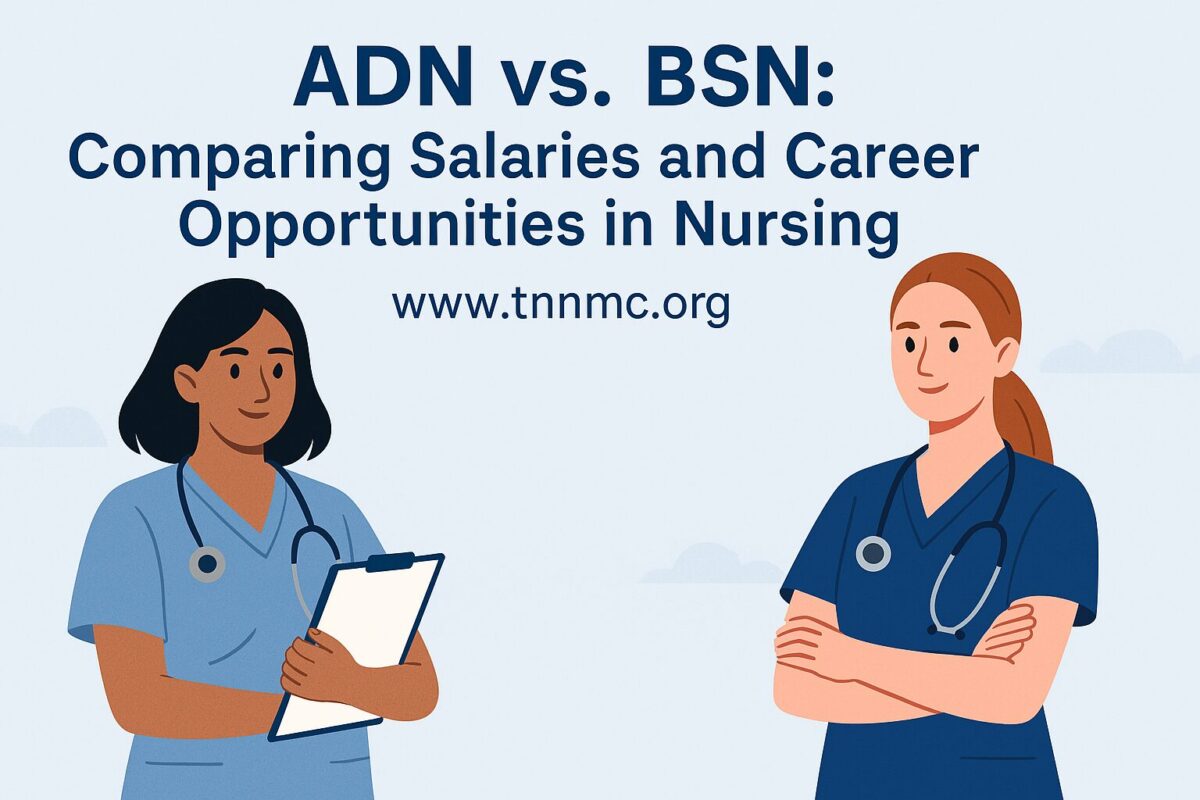
There are two main educational routes for becoming a Registered Nurse:
An Associate Degree in Nursing (ADN) and a Bachelor of Science in Nursing (BSN). An ADN is a two-year undergraduate degree offered by community or technical colleges that prepares graduates to be prepared to sit for entry-level RN positions.
On the other hand, a BSN is a four-year bachelor education provided by universities that offers a more rounded education covering more in depth examination of nursing theory, research methods, and leadership principles.
Although both degrees prepare graduates to sit for the National Council Licensure Examination for Registered Nurses (NCLEX-RN) and then obtain licensure as an RN, they prepare graduates for significantly different scopes of practice and career paths.
This report will comprehensively compare the salaries and career prospects of ADN and BSN degrees, and help readers make informed choices about their nursing education and careers.
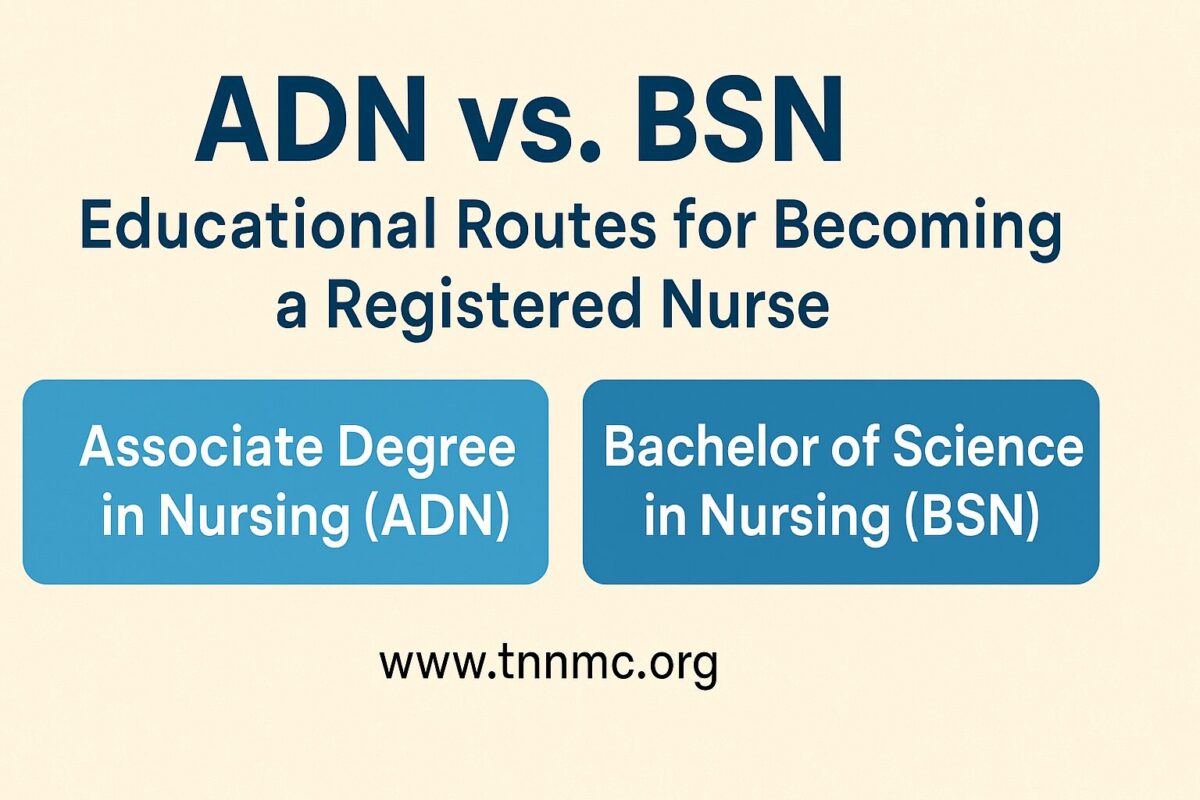
What Are ADN and BSN Grades?
In the context of nursing, an Associate Degree in Nursing refers to a two-year undergraduate program typically provided by community or technical colleges. ADN program coursework is centered around teaching basic nursing knowledge and skills needed to provide direct patient care. This program often is thought of as a quicker, less expensive route to enter the nursing profession.
The curriculum usually covers basic subjects such as human physiology, anatomy, pharmacology, and microbiology, as well as the fundamental tenets of nursing practice. ADN programs are primarily designed to produce graduates able to function within a clear, technical scope of practice and provide well-organized and well-defined nursing care in a range of healthcare environments.
ADN programs are more accessible and typically shorter in duration, making them an attractive option for individuals looking for a quick entry into the nursing profession, especially if they have financial or time limitations. Yet, this fast-tracked option may have drawbacks in terms of prospects for career growth and specialisation at a later stage, compared to a more thorough baccalaureate schooling.
On the other hand, a Bachelor of Science in Nursing is a four-year undergraduate program at universities. The BSN program gives more practical and comprehensive training in the field of nursing than the ADN.
The curriculum is not limited to foundational clinical sciences, and includes essential domains like leadership training, health systems, research methods, principles of public health, and health policy. By offering well-rounded education, BSN programs hope to create graduates that have increased critical thinking and improved communication and leadership skills.

This higher education allows nurses to take on broader roles professionally and usually confers more independence as well. In this way, BSN graduates are equipped with more foundational knowledge in leadership, research, and bigger-picture concerns in healthcare — both of which may lead to increased career mobility and opportunities for advancement again, over the course of their nursing careers. Therefore, we can consider a BSNyou can see it as an investment in your future within the profession for the long run.
Regardless of the degree gained, the primary distinction between the ADN and BSN programs is that either track culminates in eligibility to sit for the NCLEX-RN exam when completed from an accredited program. Taking this national standards test is a requirement to become a Registered Nurse and receive a license in any US state.
A major factor for FN applicants who wish to become RNs is the equivalent eligibility for the licensing exam. It emphasizes that both educational paths are legitimate means of gaining entry into the profession and that the decision to pursue an ADN or a BSN is often based on considerations beyond initial licensure, such as long-term goals and earning potential.
Both ADN and BSN graduates obtain licensure as Registered Nurses. However, the scope of practice and potential for career advancement opportunities can vary. ADN nurses generally tend to concentrate on technical clinical skills as well as direct, day-to-day patient care.
They typically work under the supervision of Registered Nurses and are responsible for carrying out care plans, performing routine nursing tasks, and contributing to the overall management of patient care in a structured healthcare setting.
BSNs, in contrast to nurses with the basic program, tend to have more opportunities in leadership positions in health care teams and in career paths for further educational improvement, such as advanced certification or studies at the graduate level.
BSN programs include more comprehensive education in managerial and administrative duties than do ADN programs, preparing their graduates to assume leadership roles and engage in broader healthcare efforts. This difference in utility and potential for evolution is among the mosttelling factor for those considering the two routes.
Salary Comparison—ADN vs. BSN
Salary expectations are a crucial element to consider when discussing the return on investment for various nursing education pathways. Statistics show that Registered Nurses with an ADN vs. BSN degree earn significantly different salaries, according to different data sources.
Entry-Level Bachelor of Science in Nursing (BSN) nurses command higher starting salaries than entry-level associates degree in nursing (ADN) nurse practitioners. One report noted an average starting salary for all nurses of approximately $68,485 — but didn’t break down by degree level.
But again, the starting salary for BSN nurses could be roughly $80,321 as per September 2024 data. Another reports entry-level BSN salaries of $23,000 to $77,500 per year, depending on locality and employer.
Internally, however, this also means that although there is a range, the tip of the iceberg for starting salary in BSN nursing indicates an immediate financial advantage over other paths, signalling that a $40000+ starting salary after graduation is still a real possibility for baccalaureate-prepared nurses.
Looking at median salaries gives a more accurate idea of the average earning potential in a more senior level career. According to the U.S. Bureau of Labor Statistics, the median annual wage of all Registered Nurses was $86,070 in May 2023.

But when they broke it down by education, Nurse. org estimate an average yearly salary of $77,001 for ADN nurses and an hourly rate for BSN nurses that converts to about $85,238 annually. The average nurse salary for those with an ADN is $79,000 according to data on Payscale, while for a BSN holds on average $96,000.
According to the 2023 Medscape Nurse Salary Report, ADN nurses earned a median annual income of $82,000 while BSN nurses earned a median annual income of $88,000. Data from March 2025 collected by ZipRecruiter reveals even higher annual pay, averaging $77,001 for ADN nurses, and a whopping $102,263 for BSN nurses.
For all these reports, one consistent theme emerges: nurses with a BSN degree tend to earn a higher median salary than their ADN counterparts. Although this figure varies significantly from year to year and source to source, it is evident that the amount of money you receive is not equivalent to that of a nurse with a BSN.
Looking at the long-term earning potential drives home the financial benefits of pursuing a BSN. According to the American Nurses Association, a nurse with a BSN could earn an average of $500,000 more than a nurse with an ADN throughout a 30- year nursing career.
According to Payscale, on average, a BSN means $17,000 more a year. These numbers illustrate the large cumulative financial impact of the difference in salaries between the two types of degrees over the course of a professional career.
The experience a person earns is a long-time investment that will pay dividends in the long run, which is extremely valuable for people who are looking to switch careers or have long-term professional aspirations because it shows that the initial cost of a BSN is worth the investment.
While these numbers come from reliable sources, you should bear in mind that nurses’ salaries, regardless of their level of degree, can differ significantly depending on their geographical location. Several factors affect nurses’ salaries, including the cost of living in certain areas and the demand for nurses in specific regions.
The states with a high demand for Nursing professionals and a higher cost of living, like California, Hawaii, Oregon, Washington, Massachusetts, and New York, generally have higher average salaries for Registered Nurses. In fact, California is usually where the highest-paying metro areas for RNs are found.
This geographic discrepancy suggests that, while BSN-prepared nurses typically earn higher salaries than ADN-prepared nurses on average nationally, the difference in their salaries, in absolute terms, may also be affected by the geographic location of work. Urban versus Rural — In most urban settings or high-demand states, nurses will earn higher than they would in a rural area or a state that has less demand for nurses.
The following table summarizes the salary gaps from the research in a more consolidated manner,
Common sense derives that with the level of education, the risk would increase as they work, yet the differences of the salaries hold significant significance.
Life After Architecture School: Career Opportunities by Degree Level
The type of nursing education obtained can play a major role in the types of job roles available to Registered Nurses. ADN and BSN degrees both provide the education required for RN licensure, but the depth and breadth of a BSN program often means that these graduates qualify for a broader variety of career paths.
ANRs—those with their Associate Degree in Nursing—are typically employed in roles directly caring for patients across healthcare settings. ADN-eligible nurses commonly work as Staff nurses for a hospital, administering basic patient care in various departments.
Home Health Nurse positions allow nurses to meet clients one-on-one, help them with ADLs, and teach them how to manage chronic illnesses in the comfort of their own homes.
Nursing homes and rehab facilities Long-term Care Nurses Working with older people and/or the chronically ill, long-term care nurses support patients’ comfort and improve their quality of life. Clinic RNs work specifically in outpatient clinics and physician’s offices, where they carry out many basic patient care tasks, administer medications, and assist with medical procedures.
Some other roles that ADN nurses might fill include emergency room nurse, pediatric nurse, oncology nurse, psychiatric nurse, or clinical research associate, based on their interests and the needs of the hiring body.
Serving in these capacities, ADN nurses frequently complete critical duties including obtaining patient health histories, giving medication, ordering lab tests, and offering health education. With experience, they may also oversee less-skilled healthcare worker assistants (CNAs) and Licensed Practical Nurses (LPNs).
ADN nurses perform all important and critical patient care; as such, they are a necessary part of the healthcare system. However, they may have fewer opportunities to move into leadership or specialized areas without attaining a BSN or further degrees.
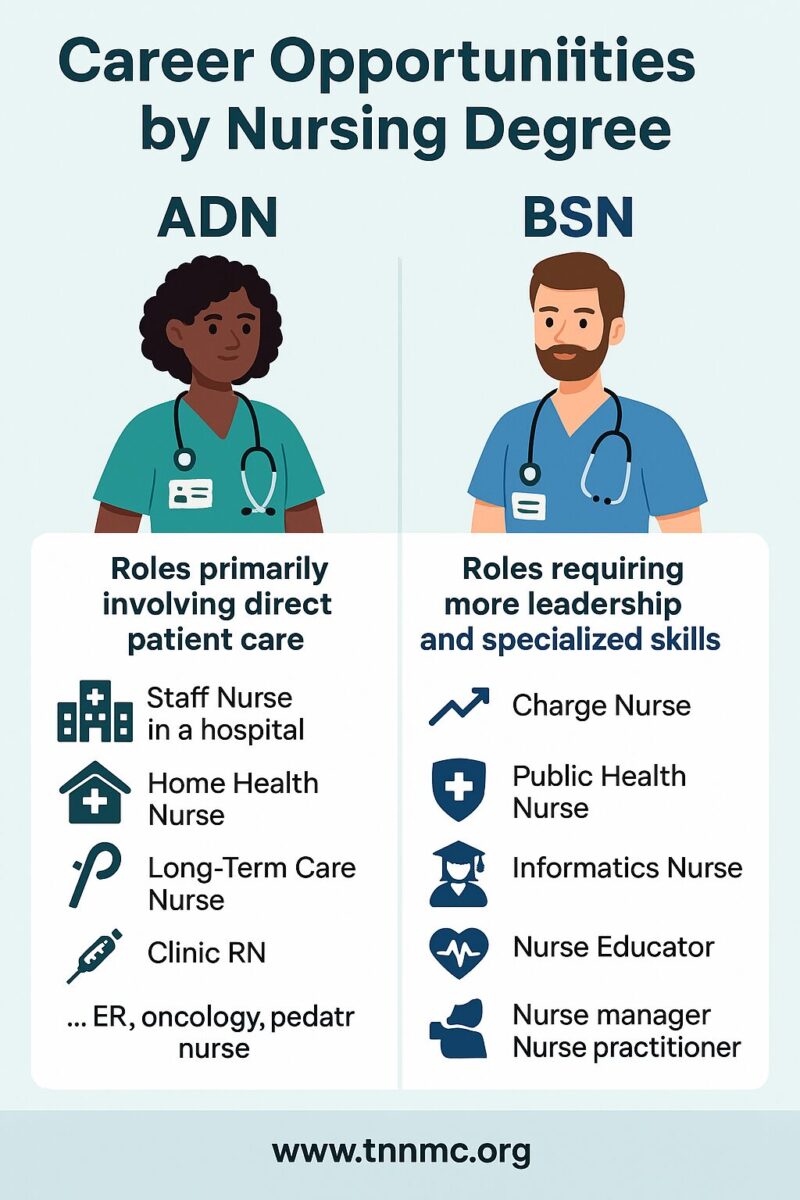
A Bachelor of Science in Nursing typically offers a wider range of career opportunities, often with more responsibility and background specialisation. The roles available to BSN-eligible or preferred nursing professionals include Charge Nurses, who lead and mentor nursing staff for an assigned unit or other shift.
This is all part of their work, assisting in getting patients the care they need in the right place at the right time and to ensure everything is done within compliance. Public Health Nurses are responsible for the health of the community as a whole via education, disease prevention and advocacy.
These nurses use their expertise in technology and patient care to work with the data and technology that shape patients’ experiences in healthcare settings.
Though a Master of Science in Nursing (MSN) is the usual prerequisite, BSN-prepared nurses can seek careers as Nurse Educators, training and mentoring tomorrow’s nurses in academic or clinical environments.
Additionally, in itself, a BSN is either a requirement or highly desired for Military Nurses and RNs in Magnet hospitals, known for their exceptional principles for nursing practice.
Infection Control RNs, Quality Control RNs, Assistant Nurse Managers, and Clinical Development Specialists are some positions that typically require a more systemic perspective on health care systems and practices.
Thanks to their comprehensive education and training, BSN nurses are often assigned higher level tasks and are better able to handle complex patient care situations.
During the determination of hiring approval, the possibility of advancement for ADN versus BSN prepared nurses is similarly disparate891011.
Provides better career prospects: Nurses who hold a BSN are often more likely to advance in their career and move into leadership and management roles within healthcare organizations.
If your goal is to move up to leadership roles such as Nurse Manager and Director of Nursing, it is likely that the candidate pool will all hold a BSN degree or even higher. In addition, a BSN is often a requisite for those pursuing graduate-level nursing education, like an MSN or a Doctor of Nursing Practice (DNP).
In all these areas, specialized advanced practice roles such as Clinical Nurse Specialists, Nurse Practitioners, Nurse Anesthetists, and Nurse Midwives—all requiring graduate-level education—make the BSN a critical first step on the path to such careers.
There are a few leader roles available to ADN nurses like Charge Nurse, however their road to becoming a nurse practitioner, clinical nurse specialist, or nurse educator leading to high position are impossible without a BSN or higher degree.
Employer Hiring Trends and Preferences
The healthcare landscape is shifting, and many employers prefer to hire nurses with a Bachelor of Science in Nursing degree. Numerous factors influence efforts amongst stakeholders—including healthcare organizations, nursing leaders, and policymakers—to advance this preference, including the complexity of patient care and enhanced understanding of baccalaureate-prepared nurses’ significant role on healthcare teams.
In fact, you are most likely to find the right indicators of the quality of care you will receive when in a magnet hospital, as the hospitals have a practical commitment to nursing excellence and elevated standards of patient care, often closely tied to the education level of the nurse employed.
These institutions often mandate that nurse leaders and nurse managers possess at least a BSN in education. Magnet hospitals might employ ADN-prepared nurses in a position, however an ADN is often strongly preferred and even a requirement for some positions or career advancement within the organization. The focus on baccalaureate education at Magnet facilities is a powerful incentive for nurses seeking employment in these elite settings to seek a BSN.
In the largest healthcare systems throughout the United States, there is a growing inclination if not a requirement for BSN-prepared nurses for entry-level Registered Nurse roles as well. This shift is reflective of a wider recognition by the health care industries of the complete scope of skill set and increased preparedness of BSN graduates.
BSN programs, by contrast, provide a rich curriculum that prepares nurses to excel in everything from nursing theory and research to leadership; as such, BSN nurses tend to be much more equipped to navigate the complexities of modern healthcare and drive improvement in patient outcomes. Increased demand amongst larger healthcare systems signals a major movement for diversification and professionalization of nursing with baccalaureate education as the standard for practice.

Government and research institutions also tend to require specific levels of education for their nurses, favoring BSN-prepared nurses. A BSN is often required for positions related to clinical research, public health initiatives, and leadership jobs in federal government healthcare agencies.
* These are roles that require a deeper understanding of evidence-based practice, population health, and health care policy, all topics that are covered more comprehensively in BSN programs than ADN programs. Thus, altering careers to work in a government or research setting often means that a BSN degree is required.
Another major influence that helped create employer preferences was the 2010 report from the Institute of Medicine (now the National Academy of Medicine), which recommended that 80% of the nursing workforce be prepared at the baccalaureate level by 2020.
This lofty goal came on the heels of an increasing body of research that connected a higher percentage of BSN-trained nurses in healthcare institutions with superior patient outcomes, including lower morbidity and improved hospital readmission rates.
Although the original target of 80% by 2020 ultimately fell short, the recommendation has clearly shaped the direction of nursing education and the expectations for nurses by healthcare employers. Graduation rates from BSN programs have increased, and the proportion of RNs in the workforce with a BSN or higher degree has grown steadily, exceeding 70% as of 2022 — indicative of the effectiveness of this national emphasis on enhancing the educational profile of nurses.
Statistics on hiring trends also reinforces BSN education’s growing value to employers. According to recent surveys, nearly 28% of employers in the healthcare field require all new employees to have a nursing bachelor’s degree, and nearly 72% of them prefer BSN-prepared candidates.
BSN graduates are also desirable in the job market: around 94% of the job offers given to BSN graduates four to six months after completing their BSN programs involve a BSN degree. Many acute care and health systems provide financial assistance to ADN-prepared nurses to pursue their baccalaureate degrees because they understand the importance of a BSN-prepared workforce.
These programs include tuition reimbursement options, tuition assistance, and a partnership with universities for discounted tuition rates for RN-to-BSN programs. Banking, paired with the high job placement rates for BSN graduates and financial encouragement to further their education, sets up a winning situation for potential and practicing nurses to lie, prepare, and opportunity when it comes to the strategic advantage of earning a BSN.
RN-to-BSN Pathways
For registered nurses who have earned an associate’s degree in nursing, there are many flexible ways to complete a bachelor of science in nursing. RN-to-BSN programs build on the knowledge and clinical experience learned as part of an ADN program and are more streamlined than seeking a baccalaureate degree through an additional degree program.
A key element of many RN-to-BSN programs is their offering as a fully online course of study. This format allows for a glorious amount of flexibility for working nurses who want to earn their BSN without ever needing to step foot in a classroom.
Enviar mensagemThe flexibility of online learning enables students to strike a balance between their studies and their professional responsibilities and personal commitments. Many schools also offer part-time enrollment options in their RN-to-BSN program.
These are part-time tracks carefully crafted to fit the sometimes non-traditional and demanding work schedule of most nurses so they can proceed through the program at a pace that works best for them. The online and part-time formats offered by many institutions greatly increase the accessibility of an RN degree for ADN-prepared nurses looking to further their careers.
The time required to complete an RN-to-BSN program can differ based on multiple variables, including if a student is enrolled full-time or part-time and the specific structure of the program. Many full-time learners are able to finish their BSN in as few as 12 months.
The part time options will make this period much longer (usually 2 years) because the student spends more time finishing the program. The price of online RN-to-BSN programs can also differ, with a total tuition of approximately $5,000 to $30,000. Certain programs—especially at public institutions—are available at the bottom of that range, with price tags as low as $10,000 or less.
The ADN to BSN upskilling route has its costs but also benefits. The benefits of an advanced practice nurse can help improve your profession by offering higher earning potential, flexibility in jobs available and career choices, the ability to apply for leadership roles or advanced nursing practice, and improving patient outcomes and health care through more educated professionals.
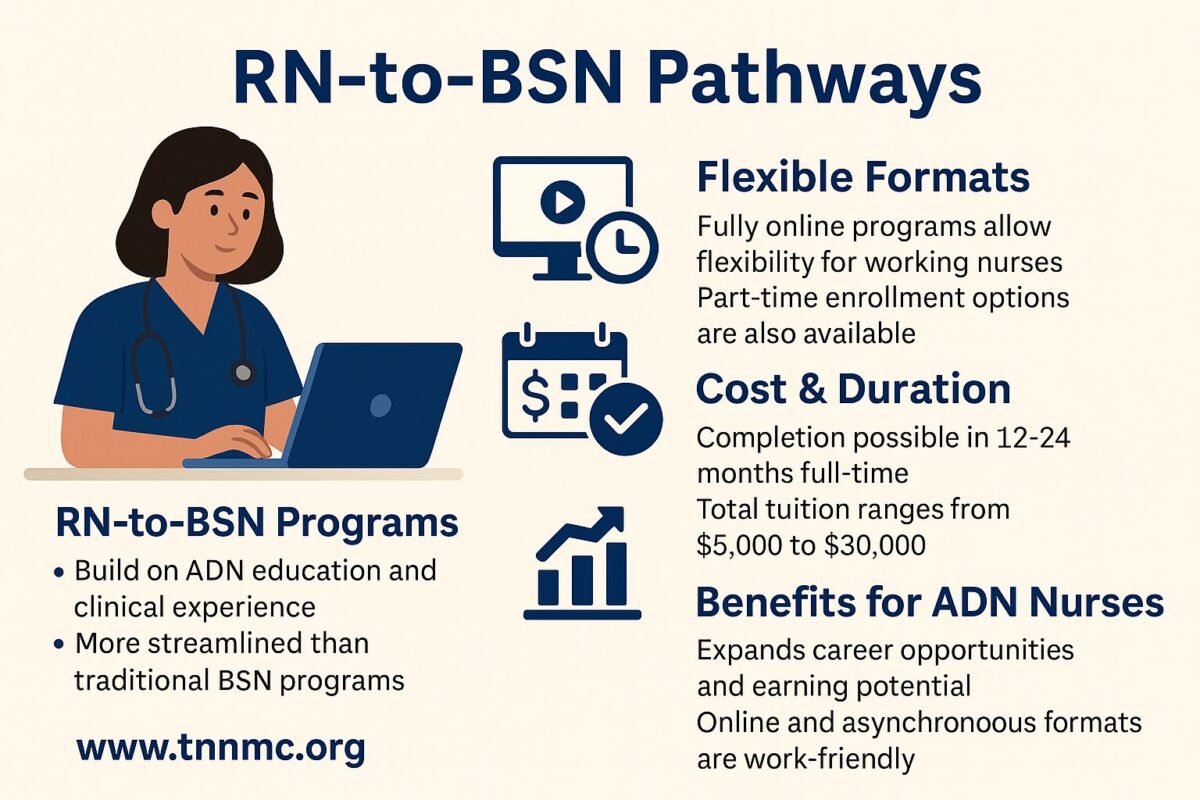
These critical financial and professional benefits, along with the relatively short completion time, make obtaining an RN-to-BSN degree worth the time and effort for ADN nurses looking to advance their careers.
RN-to-BSN programs are also helpful to ADN nurses because they can continue working while they are enrolled in higher education due to the flexibility of most RN-to-BSN programs. Many programs are also delivered in an online format, permitting students to complete coursework when it’s best for them — many programs even offer asynchronous learning so that logging in at specific times is not necessary.
This flexibility is essential for nurses balancing busy work schedules. Additionally, online RN-to-BSN programs sometimes allow the student to meet clinical requirements through application-based assignments that may be completed in the nurse’s current place of employment. Working ADN nurses find this method to enrich their nursing education and career a more strategic and less disruptive path of BSN pursuit, as work and study become increasingly intertwined.
How to Decide on the Right Degree for You
Deciding on an ADN vs. a BSN degree or whether to pursue an RN-to-BSN program is an important decision so it’s highly dependent on personal, financial, and career goals.
An ASN degree might be the right option for those who want to get into the workforce as a nurse in the quickest possible time and who have some financial or time limitations. ADN programs take less time, making it quicker for graduates to become licensed Registered Nurses and start earning that salary, as well as donning those scrubs today.
Most ADN programs have a lower up-front cost versus a four-year BSN program, making it a more economical option for some people as well. The ADN offers a great option for those looking for quick entry into the profession with a low-cost solution.
On the other hand, a Bachelor of Science in Nursing (BSN) degree has proven to be a better option for those who want to build long-term careers, seeking for positions in leadership or planning to get into advanced practice nursing.
With a BSN, nursing professionals have a stronger foundation for advancing in their careers: this degree opens the door to a range of opportunities that may have previously been denied to you, while also increasing the chances of moving into leadership and other specialized roles.
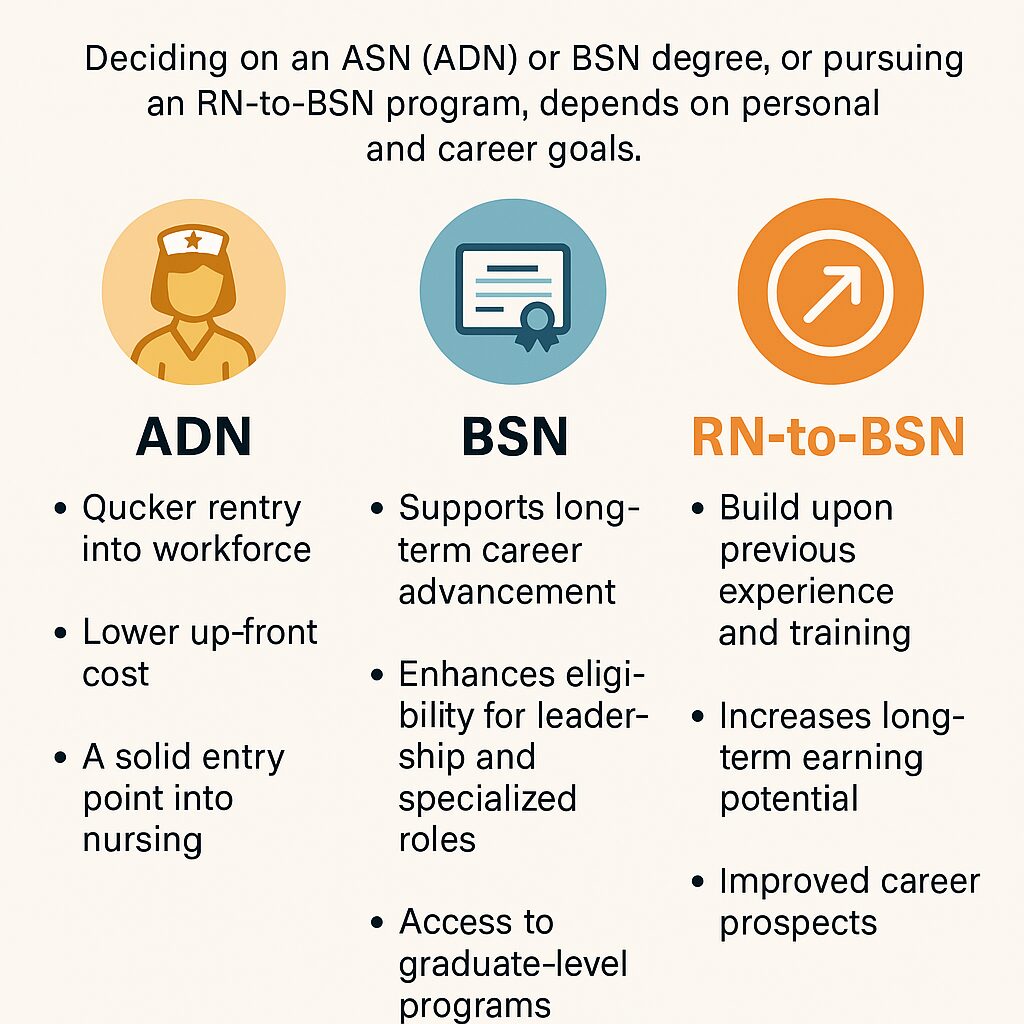
Additionally, becoming a registered nurse with a BSN is often a requirement or strongly preferred at Magnet hospitals or large healthcare systems or research or government institutions which tend to offer more competitive salaries and benefits.
Importantly, a BSN is also the passport to most graduate-level nursing programs, required for those who want to will pursue advanced practice registered nurses (APRNs) — nurse practitioners, clinical nurse specialists, nurse anesthetists and nurse midwives. A BSN is a more prudent investment for those with long-term goals of becoming a leader, specialist or advanced practice nurse.
The return on investment for each option is important but keeps in mind that these are just initial fees. The initial cost to attend a BSN program is more than attending an ADN program, the long-term earnings potential of receiving a BSN is much higher. For those choosing the BSN path, the potential earnings of hundreds of thousands of dollars over a career represent a powerful return on investment on that initial education.
In addition, the growing trend of employers preferring BSN-prepared nurses points to great job stability and many more career advancement opportunities as well, further supporting the long-term ROI of a BSN.
For nurses who have already launched their careers with an ADN, enrolling in an RN-to-BSN program allows them to use their previous experience and training to Westas an essential next step in their careers; you’ll be able to achieve increased earning potential and career opportunities long-term.
In conclusion, although both ADN and BSN degrees function as gateways into an enjoyable nursing career, the BSN presents a stronger platform to facilitate long-term professional growth and greater lifetime earnings.
The Nursing Playlist: ADN and BSN as Building Blocks
The creation provides nurses with a specific path in achieving both an Associate Degree in Nursing and a Bachelor of Science in Nursing, which facilitates the entrance process into one’s nursing career, one of the most rewarding and impactful career choices. ADN programs typically offer a faster and less expensive path to becoming a Registered Nurse, enabling graduates to acquire the necessary skills for direct patient care across different healthcare environments. This route is especially attractive for those who want to enter the workforce immediately or who are limited due to financial or time constraints.

Conversely, BSN stands for a 4-year Bachelor of Science in Nursing degree, which provides a broader and deeper nursing education that includes principles of leadership, research, an public health, as well as advanced clinical skills. This expanded training generally correlates with increased earning power, more career options, and better eligibility for leadership positions and advanced practice specializations. In addition, the growing demand for BSN-prepared nurses among employers, especially at Magnet hospitals and massive health systems, reinforces the long-term benefits and career stability that come with a baccalaureate nursing education.
In the end, the best option for one, both a ADN or BSN, is determined by one’s career goals, personal life situations and financial means. While ADNs prepare individuals for solid nursing careers, the BSN offers much more in the way of professional growth and success long term. If you are an ADN nurse that wants to advance your career, finding one of the many online RN-to-BSN programs with part-time options could be a great way to future-proof your career and give yourself the best chance at success in the ever-evolving field of nursing. No matter which way you choose to enter nursing, it is a highly rewarding and fulfilling life where you can create lasting change in the life of a person, and the lives of their family, and their community.
